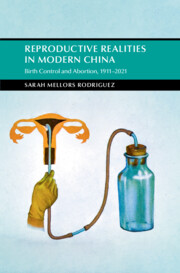Book contents
- Reproductive Realities in Modern China
- Cambridge Studies in the History of the People’s Republic of China
- Reproductive Realities in Modern China
- Copyright page
- Contents
- Figures
- Tables
- Acknowledgments
- Note on the Text
- Introduction
- 1 Building a Fitter Nation: Eugenics, Birth Control, and Abortion in Public Discourse, 1911–1949
- 2 Birth Control in Practice
- 3 Reaping the Fruits of Women’s Labor: Birth Control in the Early PRC, 1949–1958
- 4 “Birth Planning Has Many Benefits”: Weaving Family Planning into the Fabric of Everyday Life, 1959–1965
- 5 Controlling Sex and Reproduction across the Urban–Rural Divide, 1966–1979
- 6 The Rise and Demise of the One Child Policy, 1979–2015
- Epilogue: Birth Control and Abortion in the Longue Durée, 1911–2021
- Appendix: Interviews
- Glossary
- References
- Index
5 - Controlling Sex and Reproduction across the Urban–Rural Divide, 1966–1979
Published online by Cambridge University Press: 19 January 2023
- Reproductive Realities in Modern China
- Cambridge Studies in the History of the People’s Republic of China
- Reproductive Realities in Modern China
- Copyright page
- Contents
- Figures
- Tables
- Acknowledgments
- Note on the Text
- Introduction
- 1 Building a Fitter Nation: Eugenics, Birth Control, and Abortion in Public Discourse, 1911–1949
- 2 Birth Control in Practice
- 3 Reaping the Fruits of Women’s Labor: Birth Control in the Early PRC, 1949–1958
- 4 “Birth Planning Has Many Benefits”: Weaving Family Planning into the Fabric of Everyday Life, 1959–1965
- 5 Controlling Sex and Reproduction across the Urban–Rural Divide, 1966–1979
- 6 The Rise and Demise of the One Child Policy, 1979–2015
- Epilogue: Birth Control and Abortion in the Longue Durée, 1911–2021
- Appendix: Interviews
- Glossary
- References
- Index
Summary
During the Cultural Revolution (1966–1976) and the Sent-Down Youth Movement (1968–1980), the latter bringing millions of urban youth to the countryside, the city and the countryside converged in unprecedented ways. Focusing on the period from 1966 until the establishment of the One Child Policy in 1979, this chapter uses rare court records, medical guides, and memoirs to analyze the evolving tensions among national directives, local policy implementation, and grassroots sexual realities. Although the deployment of minimally trained “barefoot doctors” helped integrate state-led family planning into the rural healthcare system, local authorities used the court system to arbitrarily police abortions. By creating unprecedented opportunities for sex among unmarried youth with limited access to prophylactics, the state paved the way for the contemporary reliance on abortion as a primary tool for family planning.
Keywords
- Type
- Chapter
- Information
- Reproductive Realities in Modern ChinaBirth Control and Abortion, 1911–2021, pp. 142 - 166Publisher: Cambridge University PressPrint publication year: 2023

